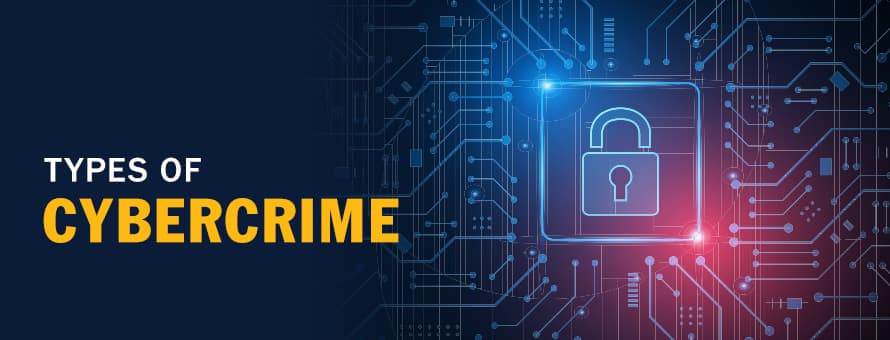What is Cybercrime?

Understanding the numbers
When reviewing job growth and salary information, it’s important to remember that actual numbers can vary due to many different factors—like years of experience in the role, industry of employment, geographic location, worker skill and economic conditions. Cited projections are based on Bureau of Labor Statistics data, not on SNHU graduate outcomes, and do not guarantee actual salary or job growth.
With the increase of internet use comes an increased need for professionals who know how to provide safeguards for businesses and individuals alike. A career in cybercrime - or a career in a field such as technology, law enforcement or business, coupled with cybercrime expertise - can position you to design and implement those very safeguards.
What is Cybercrime in Simple Terms?
In the simplest of terms, “any illegal activity that utilizes computers or the internet,” is cybercrime, said Rodney Royster, adjunct professor and subject matter expert at Southern New Hampshire University (SNHU).
Cybercrime is “frequently associated with the term ‘hacker,’” said Jason Compton, adjunct faculty in criminal justice and justice studies at SNHU, “but cybercrime is much more in depth than just that.” This is due to the many types of cybercrime that currently exist and the frequency with which they occur.
What Are Some Types of Cybercrime?
Cybercrime can take a variety of forms, all designed to steal digital information. According to Compton and Tim Craig, adjunct faculty at SNHU, some common forms of cybercrime include:
- Email Compromise: Opening an email from a sender you don’t know can potentially provide access to your computer and all of the information stored on it.
- Identity Theft: This is a form of fraud that can take many forms. Criminals will use various means to obtain key data connected to your identity, such as all or part of your phone number, date of birth, address or social security number. They can use this information to pretend to be you and then steal from you.
- Malware and Ransomware Attacks: “As the name suggests, this is malicious software that locks down your files and holds them ‘hostage’ until you pay a fee, or ‘ransom,’” Compton said. Some criminals design software to act like a Trojan horse. If an unsuspecting user clicks on a link, that click may open a virtual door of sorts allowing a computer virus to damage or even destroy a computer and the data that is on it. The word “malware” is short for “malicious software.”
- Phishing: This is the practice of sending fake emails, texts or other types of messages with the intention of soliciting a response. Criminals use your responses to their messages to learn your passwords and gain access to your accounts.
How Does Cybercrime Affect Our Daily Lives?
 Now that so much of daily life revolves around the use of electronic devices, from cell phones to laptops, to e-readers and more, it is inevitable that crime will increase in these areas as well. “Cybercrime can turn our lives upside down in just about everything we do” because of how much we use computers and the internet, Royster said. “This can include your car, home appliances, bank accounts, schools, utilities and more.”
Now that so much of daily life revolves around the use of electronic devices, from cell phones to laptops, to e-readers and more, it is inevitable that crime will increase in these areas as well. “Cybercrime can turn our lives upside down in just about everything we do” because of how much we use computers and the internet, Royster said. “This can include your car, home appliances, bank accounts, schools, utilities and more.”
The hard part is that criminals often have a high level of knowledge when it comes to how to access data, whereas the average internet user does not.
Because of this, cybercrime impacts both our personal and professional lives in many ways. That impact can “be from your credit card information being compromised after ordering something online, to stealing one’s identity for malicious purposes,” Craig said.
He added that cybercrime not only affects our personal lives as individuals but can affect us when big businesses are compromised as well. “A company can be breached where your personal data was compromised,” Craig said, causing an eventual financial impact to individuals who conducted business with that company.
Why is it Important to Prevent Cybercrime?
Keeping personal things personal is important to most people for basic privacy reasons, but the amount of theft and fraud that can be conducted through cybercrime is of concern. Reliance on information technology has “led to the targeting and exploitation of that technology as well,” Craig said. Just as the internet has become increasingly important in our daily lives, so has the need to stay safe online.
Because “almost everything today involves computers and digital information,” Royster said, it is simply good sense to ensure digital security wherever and however possible.
What Types of Cybercrime Careers Are Available?
 The job outlook for careers in cybercrime is growing as fast as the public’s internet usage. In fact, the field “seems to be recession-proof in nature,” Craig said. With the growing amount of people transitioning to remote work due to the COVID-19 pandemic, there is an increase in the number of new challenges to preventing cybercrime as well.
The job outlook for careers in cybercrime is growing as fast as the public’s internet usage. In fact, the field “seems to be recession-proof in nature,” Craig said. With the growing amount of people transitioning to remote work due to the COVID-19 pandemic, there is an increase in the number of new challenges to preventing cybercrime as well.
“As the demand for connectivity grows,” Craig said, “so does the need for support to defend against cyberattacks.” That leads to a demand for people trained to protect against such attacks on privacy and digital information.
As the usage of electronic devices has increased, so have opportunities in this field. Because “many more crimes now involve some sort of digital evidence, computers or the like,” there are more opportunities to focus on a career in law enforcement or computer forensics and add on expertise or additional training in cybercrime, Royster said.
A major or concentration in cybercrime can lead to many rewarding careers. According to Craig, some top career opportunities in this field are:
- Information Security Analyst: This field is growing quickly, much faster than average over the next ten years, according to the U.S. Bureau of Labor Statistics (BLS). With a median salary of $103,590, the earning potential for this job is solid. Information Security Analysts research, plan and implement security measures to protect an organization’s data, computer networks and other electronic collateral.
- Law Enforcement Professions: Law enforcement agencies are increasingly looking for people who can identify, prevent and investigate cybercrimes. With a median salary of $67,290, according to BLS, there are many employment opportunities nationwide that combine a career in criminal justice with technology and cybercrime investigation. Police officers and police detectives are just a few such roles.
- Network and Computer Systems Administrator: The person in this role is generally responsible for managing and maintaining the daily operation of a business’ computer networks. With a median salary of $84,810 per year, according to BLS, there are many opportunities to grow in this role working for a variety of organizations.
Careers in digital forensics investigations and intelligence within the law enforcement fields are also ways expertise in cybercrime can lead to a rewarding career.
What Are Some Large-Scale Effects of Cybercrime?
Have you shopped at Target, Costco or Home Depot? Have you ever used Facebook, Yahoo or Adobe software? If so, you are connected to a business that has experienced a data breach in the last few years, said Royster. It’s possible you never even knew about the breach.
While much of the impact of cybercrime happens to individuals, there are bigger effects of cybercrime as well. “The number of breaches, ransomware attacks, malware stealing data and online fraud has taken a toll economically for businesses and individuals,” Craig said. These attacks are continuous, with no end in sight.
The result is that companies must scramble to “find ways to protect the data and commerce at a large scale,” said Craig. This, in turn, is leading to increased job opportunities in this field, because companies are widely seeking professionals with cybercrime expertise to “help protect companies from financial ruin.”
What Can a Regular Person do to Protect Themselves from Cybercrime Attacks?
As an ever-growing problem, people and businesses need safeguards in place to protect themselves from cybercrime attacks. As individuals, being mindful of how we manage our personal data is key. “The need for people to limit what they post or enter online is crucial,” said Craig. “The use of strong and complex passwords is key as well. We need to make it hard for the ‘bad guy’ to get in,” he said. After all, we protect our physical spaces with locks, cameras and lighting. “We need to protect our 'internet home’ the same way.”
Royster offers some tips for safeguarding your digital identity, which include:
- Only download email attachments or click on links when you know the sender
- Keep your antivirus software up to date
- Use a firewall
- Protect your passwords and change them frequently
- Never share personal information, such as banking information, over the phone unless you are certain of the identity of the person with whom you are speaking
A Concentration in Cybercrime Works Well with Which Majors?
 While a concentration in cybercrime can pair well with many different majors and career paths, the following majors are particularly good matches, according to Craig:
While a concentration in cybercrime can pair well with many different majors and career paths, the following majors are particularly good matches, according to Craig:
- Criminal justice: Many careers in the criminal justice field have a need for specialists in digital forensics and digital intelligence. In fact, “cybercrime professionals are more heavily utilized for investigation and analysis of criminal offenses,” said Compton.
- Information security: This field can include studies in computer science, programming and various kinds of technology and information systems.
- Business: With so many businesses needing help protecting themselves from cyberattacks, having a strong understanding of the business world coupled with cybercrime knowledge could be a strong combination for a rewarding career.
What Can You Do if the Topic of Cybercrime Interests You?
If identifying and preventing cybercrime interests you, keeping current with technology is key. Earning a degree or gaining professional experience in a career field that involves business, technology, computer science or law enforcement are great ways to incorporate cybercrime studies.
And, no matter what your career path, don’t forget to change your passwords.
Discover more about SNHU’s online criminal justice degree with a concentration in cybercrime: Find out what courses you'll take, skills you’ll learn and how to request information about the program.
Marie Morganelli, PhD, is a freelance content writer and editor.
Explore more content like this article

Academic Spotlight: Dr. Laman Tasch, Associate Dean of Academic Strategy, Social Sciences

Why Earning His BA in Political Science Mattered to Anthony Fernandez

What Can You Do With a Master’s in Criminal Justice?
About Southern New Hampshire University

SNHU is a nonprofit, accredited university with a mission to make high-quality education more accessible and affordable for everyone.
Founded in 1932, and online since 1995, we’ve helped countless students reach their goals with flexible, career-focused programs. Our 300-acre campus in Manchester, NH is home to over 3,000 students, and we serve over 135,000 students online. Visit our about SNHU page to learn more about our mission, accreditations, leadership team, national recognitions and awards.


